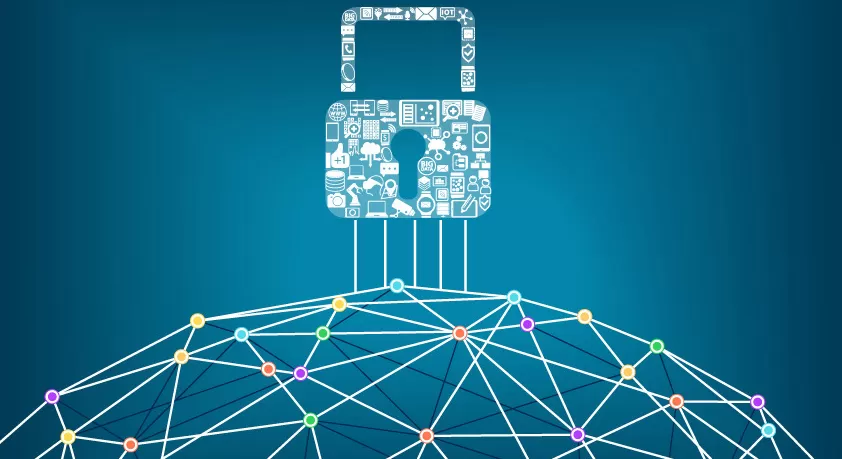Written By:
Scott McAuley
Scott is the IT Director of Texas Management Group, and has been in the IT industry for 25 years.
Did you know that 43% of cyberattacks target small businesses?
As a small enterprise owner, it’s crucial to prioritize network security to protect your company’s data and ensure the trust of your customers.
In this article, we will explore the importance of business network security and provide you with best practices to implement in your small enterprise.
Key Takeaways
- Small businesses are prime targets, with 43% of cyberattacks directed at them, highlighting the critical need for robust network security measures.
- Implementing strong network security safeguards your company’s sensitive data, ensuring the confidentiality and integrity of customer information, financial records, and intellectual property.
- Effective network security practices help prevent data breaches and cyberattacks, minimizing the risk of financial loss, legal consequences, and damage to your company’s reputation.
- Strengthening your network security improves your overall cybersecurity posture, enabling better threat identification, prevention, and response strategies.
- Prioritizing network security builds and maintains customer trust, demonstrating your commitment to protecting their data and fostering long-term loyalty and business growth.
Table of Contents
What is Business Network Security?

Business network security is a crucial aspect of protecting your computer networks, systems, and data from unauthorized access, attacks, and threats.
It involves the implementation of a combination of hardware and software technologies, policies, and procedures that work together to create a secure network environment.
Why is Network Security Important to Businesses?
Network security plays a crucial role in protecting businesses from various threats and vulnerabilities.
As a business owner, it is important to prioritize network security to safeguard sensitive data, maintain customer trust, and mitigate financial and reputational risks.
Safeguarding Sensitive Data: Implementing robust network security measures helps protect sensitive data such as customer information, financial records, and intellectual property from unauthorized access, theft, and misuse.
Preventing Data Breaches and Cyberattacks: Network security measures act as a barrier against potential cyberattacks and data breaches, minimizing the risks associated with financial losses, legal consequences, and damage to reputation.
Enhancing Cybersecurity Posture: By establishing strong network security practices, businesses can strengthen their overall cybersecurity posture. This includes identifying vulnerabilities, implementing preventive measures, and responding effectively to potential threats.
Maintaining Customer and Partner Trust: Customers and partners place high importance on the security of their data when conducting business. Implementing network security measures demonstrates a commitment to protecting their sensitive information, fostering trust and loyalty.
Investing in network security not only protects businesses from potential risks but also provides a competitive advantage. By prioritizing network security, businesses can establish themselves as reliable and trustworthy partners, gaining a competitive edge in the market.
How Does Network Security Work?
Network security is a vital component of protecting your business’s computer networks, systems, and data. Network security protects your data by deploying multiple layers of defense to safeguard against unauthorized access and potential threats.
By implementing various technologies and strategies, network security ensures the integrity, confidentiality, and availability of your network resources.
There are several key technologies involved in network security:
- Firewalls: Firewalls act as a barrier between your internal network and the external world, monitoring and controlling incoming and outgoing traffic. They serve as the first line of defense against unauthorized access and can block potentially harmful or malicious data packets.
- Antivirus Software: Antivirus software protects your network from malware, viruses, and other malicious software by detecting and eliminating these threats. It constantly scans for potential infections and keeps your network safe from harmful files.
- Virtual Private Networks (VPNs): VPNs provide a secure connection between remote users or branches and the main network. They encrypt data transmitted over the internet, ensuring confidentiality and preventing unauthorized interception.
- Access Control Systems: Access control systems enforce authentication and authorization mechanisms to ensure that only authorized individuals have access to network resources. This helps prevent unauthorized access and protects against insider threats.
Benefits of Business Network Security

Implementing a robust business network security system offers numerous benefits, including:
- Protection of Sensitive Data: A good network security system helps protect sensitive business data, such as customer information, financial records, and intellectual property, from unauthorized access, theft, or compromise. This ensures the confidentiality and integrity of critical business information.
- Prevention of Data Breaches: Effective network security measures help prevent data breaches and cyber-attacks by detecting and blocking malicious activities, such as malware infections, phishing attempts, and unauthorized access attempts. By proactively identifying and mitigating security threats, businesses can avoid costly data breaches and associated damages to their reputation and finances.
- Business Continuity and Operational Resilience: Implementing network security measures helps ensure business continuity and operational resilience by minimizing the impact of security incidents and disruptions. By safeguarding network infrastructure and data, businesses can maintain uninterrupted operations, reduce downtime, and mitigate the risk of financial losses resulting from security breaches or system outages.
- Compliance with Regulations and Standards: A good network security system helps businesses comply with regulatory requirements and industry standards related to data protection and cybersecurity. By implementing security controls and measures recommended by regulatory authorities and industry best practices, businesses can avoid penalties, fines, and legal liabilities associated with non-compliance.
- Protection of Customer Trust and Reputation: Strong network security measures help build and maintain customer trust by demonstrating a commitment to protecting their sensitive information and privacy. By safeguarding customer data from security breaches and unauthorized access, businesses can enhance their reputation, retain customer loyalty, and differentiate themselves from competitors in the marketplace. Additionally, a good network security system helps mitigate the risk of reputational damage and loss of trust resulting from security incidents or data breaches.
10 Threats to Business Network Security
Business network security is constantly at risk from a variety of threats and challenges. It is important for small enterprises to be aware of these threats and take appropriate measures to mitigate and prevent them.
Here are some common threats that can pose a risk to business network security:
- Malware: Malicious software, including viruses, worms, Trojans, and ransomware, poses a significant threat to business network security by infecting systems, stealing sensitive data, or causing operational disruptions.
- Phishing Attacks: Phishing attacks involve fraudulent emails, messages, or websites designed to deceive users into revealing sensitive information, such as login credentials or financial details, which can be used for identity theft, fraud, or unauthorized access to business networks.
- Social Engineering: Social engineering tactics, such as pretexting, baiting, or impersonation, exploit human psychology to manipulate individuals into divulging confidential information or performing actions that compromise network security.
- Insider Threats: Insider threats, whether malicious or unintentional, pose a significant risk to business network security. This includes disgruntled employees, negligent insiders, or third-party contractors with access to sensitive data and systems.
- Data Breaches: Data breaches involve unauthorized access to confidential or sensitive information, such as customer records, financial data, or intellectual property, which can result in financial losses, legal liabilities, and damage to the organization’s reputation.
- Distributed Denial of Service (DDoS) Attacks: DDoS attacks overwhelm business networks with a flood of traffic, causing network congestion, downtime, and service disruptions, which can result in financial losses and damage to the organization’s reputation.
- Man-in-the-Middle (MitM) Attacks: MitM attacks intercept and modify communication between two parties, allowing attackers to eavesdrop on sensitive information, steal credentials, or inject malicious code into network traffic.
- Zero-Day Exploits: Zero-day exploits target previously unknown vulnerabilities in software or hardware, which can be exploited by attackers to gain unauthorized access to business networks, steal sensitive data, or disrupt operations.
- Unsecured IoT Devices: Internet of Things (IoT) devices, such as smart thermostats, security cameras, and connected appliances, often lack adequate security measures, making them vulnerable to exploitation by attackers for unauthorized access or surveillance of business networks.
- Data Loss or Theft: Data loss or theft occurs when sensitive information is inadvertently exposed, stolen, or deleted, either through insider actions, accidental disclosure, or cyber-attacks, resulting in financial losses, legal liabilities, and damage to the organization’s reputation.
12 Types of Network Security Solutions
In order to enhance network security, businesses can implement a variety of network security solutions. These solutions are designed to protect different aspects of a business’s network environment and ensure the overall security of their systems and data.
Let’s explore twelve key types of network security solutions:
| Network Security Solution | Description |
|---|---|
| Access Control | Regulate and manage network access to authorized individuals. |
| Anti-Virus/Anti-Malware Software | Detect and remove viruses and malware from the network. |
| Firewalls | Monitor and control network traffic to prevent unauthorized access. |
| Virtual Private Network (VPN) | Secure remote access to the network over the internet. |
| Web Security | Protect against web-based threats and unauthorized access to web applications. |
| Application Security | Secure software applications from vulnerabilities and attacks. |
| Intrusion Prevention System | Proactively detect and block network threats. |
| Network Segmentation | Divide the network into isolated subnetworks to minimize the impact of breaches. |
| Email Security | Protect against email-based threats such as spam and phishing. |
| Data Loss Prevention | Prevent the loss or leakage of sensitive data. |
| Behavior Analytics | Analyze user behavior to detect anomalies and potential security risks. |
| Mobile Device Security | Secure mobile devices and prevent mobile-specific threats. |
1. Access Control
Network access control systems enable businesses to regulate and manage who can access their network and resources. By implementing user authentication, authorization, and accountability measures, businesses can ensure that only authorized individuals have access to sensitive information and resources.
2. Anti-Virus/Anti-Malware Software
Anti-virus and anti-malware software are essential tools for protecting against malicious software and threats. These software solutions scan for and remove viruses, malware, spyware, and other malicious programs that can compromise the security of a business’s network.
3. Firewalls
Firewalls act as a barrier between a private internal network and external networks, such as the internet. They monitor and control incoming and outgoing network traffic based on predetermined security rules, preventing unauthorized access and filtering out potentially harmful data packets.
4. Virtual Private Network (VPN)
A Virtual Private Network (VPN) enables secure remote access to a business’s network over the internet. By encrypting data and establishing a secure connection, VPNs allow employees to securely access network resources from remote locations, minimizing the risk of unauthorized access or data interception.
5. Web Security
Web security solutions protect against web-based threats, such as malware, phishing attacks, and unauthorized access to sensitive web applications. These solutions often include features such as web filtering, URL reputation checks, and content inspection to ensure safe browsing and protect against malicious activities.
6. Application Security
Application security measures focus on securing software applications from potential vulnerabilities and attacks. This involves implementing secure coding practices, conducting regular vulnerability assessments, and using techniques like source code analysis and penetration testing to identify and address potential security flaws.
7. Intrusion Prevention System
An Intrusion Prevention System (IPS) monitors network traffic for potential threats and takes proactive measures to block or mitigate these threats. Intrusion prevention systems can detect and prevent various types of attacks, such as denial-of-service attacks, network-based malware, and unauthorized access attempts.
8. Network Segmentation
Network segmentation involves dividing a business’s network into smaller, isolated segments or subnetworks. By separating network resources based on security requirements, businesses can minimize the impact of potential breaches or attacks and prevent attackers from easily moving laterally within the network.
9. Email Security
Email security solutions protect against email-based threats, such as spam, phishing, and malware attachments. These solutions employ various techniques, including anti-spam filters, email encryption, and email authentication protocols, to ensure the confidentiality and integrity of email communications.
10. Data Loss Prevention
Data loss prevention tools help businesses prevent the accidental or intentional loss, theft, or leakage of sensitive data. These tools monitor and control data transfers, enforce data protection policies, and detect and block unauthorized access or data exfiltration.
11. Behavior Analytics
Behavior analytics solutions analyze user behavior and network activity to detect anomalies and potential security incidents. By monitoring patterns, deviations, and suspicious activities, behavior analytics can identify insider threats, compromised accounts, and other security risks before they cause significant harm.
12. Mobile Device Security
As mobile devices become an integral part of business operations, mobile device security measures are essential to protect against mobile-specific threats. This includes implementing mobile device management (MDM) solutions, enforcing device encryption, and using remote wipe and lock features to secure data on lost or stolen devices.
15 Steps to Build Your Business Network Security

Building a robust business network security requires implementing specific steps and best practices. By following these guidelines, you can strengthen your network defenses and safeguard your valuable data.
Here are 15 essential steps to help you create a secure network environment:
1. Update Router Firmware
Regularly update your router firmware to ensure you have the latest security patches and features. Outdated firmware can leave your network vulnerable to attacks and exploit known vulnerabilities.
2. Develop Policies
Create comprehensive security policies that outline acceptable use, password requirements, strict access management policies, data handling practices, and incident response procedures. Train your employees on these policies to ensure compliance.
3. Encrypt Data
Encrypt your sensitive data both at rest and in transit. Utilize encryption algorithms to protect your data from unauthorized access, even if it falls into the wrong hands.
4. Conduct Regular Inspections and Vulnerability Scans
Perform regular inspections and vulnerability scans to identify potential weaknesses in your network infrastructure. Address any vulnerabilities promptly to minimize the risk of exploitation.
5. Run Network Audits
Conduct network audits to assess the overall security of your network. Review access controls, user privileges, and network configurations to ensure they align with your security policies.
6. Stay Informed on New Risks
Stay up-to-date with the latest security risks and trends. Subscribe to reputable security blogs and newsletters to stay informed about emerging threats and technologies.
7. Build and Maintain Your Firewall and Antivirus
Install and regularly update firewalls and antivirus software to protect your network from unauthorized access and malware. Configure them to block suspicious activity and regularly scan for threats.
8. Invest in VPN Technology
Invest in Virtual Private Network (VPN) technology to secure your remote connections and protect sensitive data transmitted over public networks. Use VPNs to establish encrypted and private communication channels.
9. Use Multi-Factor Authentication
Implement multi-factor authentication (MFA) for accessing critical systems and data. Require users to provide multiple forms of verification, such as a password and a unique code sent to their mobile device.
10. Implement Single Sign-On
Implement Single Sign-On (SSO) solutions to simplify user authentication across multiple systems and applications. This helps reduce the risk of weak or reused passwords.
11. Regularly Train Employees on Security Practices
Train your employees on security best practices, such as recognizing phishing emails, creating strong passwords, and safely using company devices. Regular training helps reinforce security awareness and promotes a security-conscious culture.
12. Create Strong, Secure Passwords
Enforce the use of strong, unique passwords for all user accounts. Encourage the use of password managers to securely store and generate complex passwords.
13. Regularly Backup Your Data
Regularly back up your critical data to prevent data loss in the event of a breach or system failure. Store backups securely and test the restoration process periodically.
14. Create Data Recovery Strategies
Develop data recovery strategies to minimize downtime and ensure business continuity in the event of data loss. Implement procedures for recovering data and restoring systems quickly and efficiently.
15. Conduct Penetration Testing
Perform regular penetration testing to assess the effectiveness of your security controls. Hire professional security testers who can simulate real-world attacks and identify vulnerabilities that need to be addressed.
Conclusion
In today’s digital era, securing your business network is paramount for safeguarding data, maintaining customer trust, and ensuring continuity.
This article has explored the importance of business network security and provided essential practices for small enterprises. From grasping the fundamentals to implementing advanced technologies, every step contributes to a more resilient network environment.
By investing in robust security measures, businesses can mitigate risks, prevent data breaches, and foster trust with customers. Remember, network security is an ongoing process. Stay vigilant, informed, and proactive to navigate the evolving threat landscape confidently.
With continuous evaluation and enhancement, you can fortify your network and ensure the long-term success of your small enterprise.
Interested in Proactive Network Security?
Explore our security-focused blogs for guidance, and learn how our Managed Cybersecurity Services can keep your business safe from threats.
Start protecting your business today!
FAQ
What is Network Security in Business?
Network security in business refers to measures taken to protect the integrity, confidentiality, and availability of a company’s network infrastructure, data, and systems from unauthorized access, misuse, and cyber threats.
How can I Make my Business Network More Secure?
You can make your business network more secure by implementing measures such as using firewalls, encryption, strong passwords, regular software updates, employee training on security best practices, and implementing access controls.
What is the Importance of Network Security?
The importance of network security lies in safeguarding sensitive data, maintaining business continuity, protecting against financial losses and reputational damage from cyberattacks, and ensuring compliance with regulations.
How Effective is Network Security?
Network security can be highly effective when implemented properly with a combination of technological solutions, proactive monitoring, regular updates, and employee awareness. However, it’s essential to continuously adapt security measures to evolving threats to maintain effectiveness.






